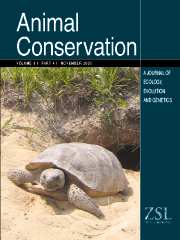Article contents
Cryptic chromosomal variation in suni Neotragus moschatus (Artiodactyla, Bovidae)
Published online by Cambridge University Press: 30 March 2001
Abstract
Thirty-eight captive-born suni (Neotragus moschatus) had chromosomal complements of 2n = 52–56 (fn = 60). Variation in diploid number was the result of two centric fusion polymorphisms: a 4;19 fusion and a putative 18;22 fusion. Specimens that were descendants of wild-caught N. m. akeleyi and N. m. zuluensis were 2n = 52 and 56, respectively, but 2n = 53, 54, and 55 cytotypes were probably the result of hybridization in captivity between the two subspecies. Although populations of suni from different geographic regions are phenotypically indistinguishable, cytogenetic differences between N. m. akeleyi and N. m. zuluensis indicate that they should be recognized as distinct management units. Chromosomal variation among our panel of captive-born specimens and evidence of higher perinatal mortality in supposed hybrid cytotypes suggest that these two subspecies be managed as separate populations, particularly with regard to captive breeding, reintroductions, and animal translocations. Insofar as our findings are restricted to the captive population, the cytogenetics of natural populations of suni should be investigated to determine if indeed N. m. akeleyi and N. m. zuluensis have fixed chromosomal differences or if the centric fusion polymorphisms found in captive animals also occur in wild suni.
- Type
- Research Article
- Information
- Copyright
- © 1998 The Zoological Society of London
- 5
- Cited by




